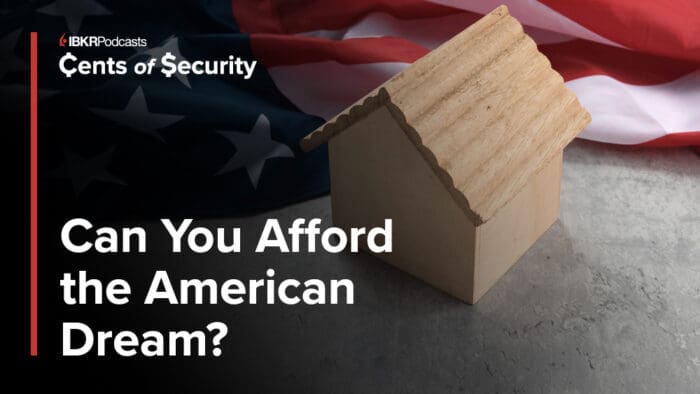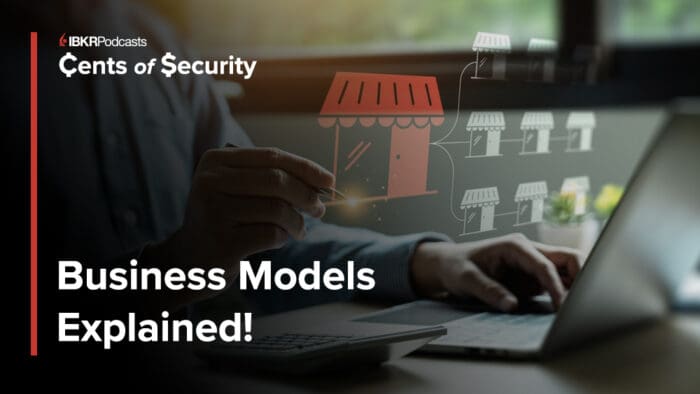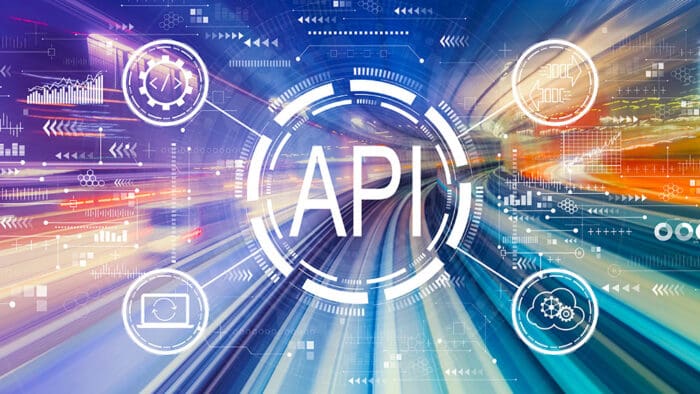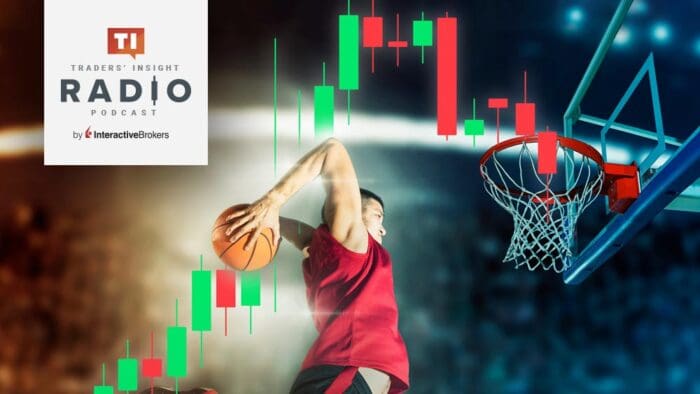What tools are available to help you go from financial hobbyist to savvy investor? Find out, as IBKR senior market analyst Steven Levine jumps into the financial education arena with Game Plan CEO and founder Vin McCaffrey, along with IBKR’s director of trading education Andrew Wilkinson, for an exciting discussion about how they are providing – and collaborating – on offering critical, finance-related content to collegiate and professional athletes.
Summary – Traders’ Insight Radio Ep. 24: What’s Your Investment Game Plan?
The following is a summary of a live audio recording and may contain errors in spelling or grammar. Although IBKR has edited for clarity no material changes have been made.
Steven Levine
Hello, and welcome to IBKR Traders’ Insight Radio Podcast. I’m Steven Levine, senior market analyst at Interactive Brokers. I’m your host for today’s program, where we’ll be talking about the importance of financial education – not only what we offer here through the IBKR Campus, but what those offerings can mean to those who choose to tackle the basics, and complexities, of the financial markets – in this case collegiate and professional athletes.
Here with us to provide their insights are Vin McCaffrey, CEO and founder of Game Plan, along with Andrew Wilkinson, IBKR’s director of trading education.
Welcome, gentlemen! Thanks for taking the time!
Vin McCaffrey
It’s a pleasure to be here, thanks!
Andrew Wilkinson
Very welcome, Steve. How are you doing?
Steven Levine
I’m doing great. I’m doing great. I think before we get started – Andrew, I should wish you a very, very happy anniversary. I understand that this year marks your 15th year here at IBKR.
Andrew Wilkinson
Well, 13. I was away for two years, but I came back in a blaze of glory.
Steven Levine
It’s all great.
Well, education. Education is our focus, and education is important, and it seems fairly common these days that the broker community offers educational material about the financial markets, as well as what different economic data means. In fact, IBKR and Game Plan have recently embarked on a collaborative initiative to help collegiate, professional athletes and others to have ready access to – and engage more with – certain educational material offered through IBKR’s Campus.
A little bit about Game Plan – the company was founded by Vin McCaffrey back in 2008 as a way to help college athletes find jobs, and since then he’s evolved it into a platform that integrates e-learning, mentorship, and career services for athletics organizations, including over 900 athletics organizations across the U.S., as well as all the major professional leagues.
Vin, the Game Plan platform offers courses on a host of different topics … responsible gaming, professional development, as well as introductory courses through IBKR’s Traders’ Academy – and we’ll circle back to that in a bit. Basically, I understand Game Plan as a platform for e-learning and career services…. but, can you tell us more about your company? How did it all begin?
Vin McCaffrey
Yeah, we’re the largest provider of education to athletes in the country, but interestingly enough, we started with the idea of ‘indeed.com for athletes. We wanted to help athletes get jobs because of all the great, transferable skills they have. Employers desire those transferable skills. We kind of think that those are team-oriented, competitive, receive feedback well, and so forth. We want to help those collegiate professional athletes as they transitioned out, so that was the initial genesis. The challenge became really quickly of it becoming a chicken or egg dilemma in that you have to have the athletes to be able to get the jobs – you have to have the jobs to be able to get the athletes. And so, that’s a fundamental challenge we ran into. We started to build some tools online to help an athlete think about their transition into the workforce — to go work for an Interactive Broker, for example – and interestingly enough, the schools, the athletics departments – collegiate athletics departments – we were working with to be able to pull into student athletes into the platform, started using those assessment instruments – and they were identity assessments around your interest, where you would fit culturally…. They weren’t using them to help the student athlete on the transition out; they were actually helping them on the transition in. And that was a bit of an ‘a-ha’ moment for us, saying that we’re … as opposed to solving for this transactional challenge, but let’s help an athlete get a job … the ‘indeed’ model … let’s help an athlete move through this journey. And what we realized is the assessment instruments … and we followed up pretty quickly with some education … really took form. And it was a great fit. And we started solving a lot of problems both on campus, as well as in professional leagues.
Steven Levine
I understand you started this in 2008. So, you know, we had the housing crisis then, and we had the credit crunch…. I wonder if any of what happened back then inspired or affected your decision to provide more financial education where you believed it might be needed.
Vin McCaffrey
Yeah, you know, at the moment in time I would say probably not, you know, because we were again with the mission of helping from the career standpoint. But under the covers, you know, I played college basketball 25-plus years ago, but in the summer, I worked at Merrill Lynch. I would presume that I’ve thought about investment education for a long time, and seeing athletes going through the experiences that we do and the number of athletes that we have in the platform now, I’ve always thought there’s a real opportunity and need here. But we were going out and trying to solve that particular mission of focus around career development, it wasn’t until a few years later when we started to realize that it’s all one common experience that an athlete’s moving through, or an individual for that matter, is moving through. And that’s the development and growth. Particularly, if you think about, you know, your collegiate experience, it’s all coming at you real fast, so the need for investment education is really high and we fit that now, which is a unique aspect of it. But at the time, 2008, it was just get this thing off the ground. Let’s help, let’s help some athletes get some jobs. You know, now, 20/20 hindsight, we look back and say, yeah, investment education is a critical path for that individual.
Steven Levine
So, who exactly…. I know you work with all these athletics organizations … are they all athletes that use this? Or who exactly uses it, and how is it that they use it? I mean, do they have like progress tracking and this kind of thing? Or how does it work?
Vin McCaffrey
So, if you think about it, we’re approaching close to 1,000 athletic organizations. So, that’s collegiate athletics departments, professional leagues, all the major professional leagues, and our primary user is the athlete in college – in college, that’s the student athlete, in pro sports, the minor league athlete or the professional athlete. And so that’s our primary user. We’ve since expanded the use case within the platform to their primary stakeholders: coaches, administrators, and more. And so, that’s a big aspect of the key user base. But first and foremost, the focus is around the athlete. Those organizations work with Game Plan as an athletics organization. So, we’re not working with an individual athlete from that standpoint. We’re not a consumer product from that perspective. But what’s interesting is it tends more times than not to start in collegiate athletics – they would call ‘compliance education’; professional athletics, it might be ‘rules education’. And so, from that standpoint, it’s ‘must-have’ forms of education that tend to be highly trackable.
You think about collegiate athletics, regardless of what organization or association you’re playing in … NAIA [National Association of Intercollegiate Athletics] junior college or the NCAA [National Collegiate Athletic Association] … there are a set of rules that student athletes have to abide by. And so, we provide that rules education in a highly trackable form.
If you’re an athletics administrator … and, you know, I’ve played basketball, Lehigh … if you’re at Lehigh athletics, that’s a big benefit, because now it’s a simple tool to be able to send out all that education in one place, and it works really easy and simple, and we’re an extension to the athletics department at that point. Where the magic happens in our mind … because our mission has been focused for years now on this idea of seeing an athlete through their own personal journey … once an athlete starts in rules education, ‘Compliance 101’, that’s never where we wanted to land and live, but it’s a hell of a starting point. So, if we’re able to start with the athlete in a place that’s a ‘must-have’ form of education, and we begin to learn a little bit about their interest, we learn a little bit about their cultural fit, we learn a little bit about their major, we learn a little bit about them. We’re able to then introduce other forms of education. Some of those forms may come in the form of a required aspect associated with their campus or league that they have to go through. Could be investment education’s required, but we also make that investment education. For example, we’re doing with Interactive Brokers from a standpoint of just an optional opportunity, but the more we learn about that athlete, our learning systems behind the scenes are able to then suggest and recommend certain parts of the platform to that person, and that’s where it’s great. So, the student athlete or professional athletes starts with compliance. They’re going to land in a place that’s going to see education and opportunities that will guide them for years after.
Steven Levine
Yes, and I mean, there’s the academic side of it, I suppose, and then there’s also the practical side of it. And as far as I understand, financial education, in general … to apply any of it, it really is like sports in the way that you are earning every yard of the way, you really have to fight for every yard and understand what you’re doing every step of the way. So, Andrew, people who are just starting out – on the road to becoming savvy traders and investors – they have to start somewhere on their journey, right? So, what does it look like for someone just starting out in terms of financial education? What do they start off with exactly in your view?
Andrew Wilkinson
I suppose most people read the Internet. They used to read a newspaper, but, you know, you find certain portals – you’ll go to Google Finance, Yahoo Finance. You’ll look at articles from MarketWatch or the Wall Street Journal. You might even get a subscription. And for anybody with a 401(k), for example, at Fidelity you can log in there and stay abreast of what’s actually happening in the market.
Steven Levine
Yes, and I suppose, paying attention to those resources – also, those in the IBKR Campus, and we’ll explore those more deeply a bit later— it’s all becoming increasingly important these days. I mean, we’ve been experiencing some critical challenges in the economy – namely inflation, as well as monetary policy decisions by – not only the Fed [Federal Reserve Bank], but people are also watching the ECB [European Central Bank] and Europe closely, and other global central banks … so many heightened risks – geopolitical tensions, and so on. I mean, we’ve had major events in the financial markets and economy in the past: obviously, the 2008 crisis; we’ve had, you know, the Great Depression. I don’t know if we’re facing something like that now. A lot of people are talking about a ‘Great, Great Recession’. I don’t know where we’re headed. But the need for financial education, I mean – Vin, do you see that there are certain events today that are driving financial education now, especially for colleges – for college athletes … for professionals?
Vin McCaffrey
Yes, to answer your question. Deep down, college athletes, professional athletes … focus-in for a moment on the college athletics side, because there are some unique distinctions between a collegiate and professional athlete … sometimes, they’re blended together with some of the goings on, but the reality is they’re very different in how they approach the experience. Collegiately, they’re a college student, and college is really expensive, and depending if they’re on a full scholarship or not really impacts one’s idea of how they’re thinking about their finances, for example. Lately, and I’m not sure if you’re a big college sports fan or not, but there’s been a few initiatives that have taken off taking a lot of the lion’s share associated with the media, where student athletes are able to leverage their name, image, and likeness to make some money. And I don’t look at that as a bad thing, but it’s an interesting opportunity that some of these student athletes are making quite a bit of money. By and large, overall, I think if you kind of normalized it across the half a million student athletes playing sports say, ‘It’s probably not a lot’, but there are a bucket where there’s quite a bit of money coming their way that would look akin to a professional athlete. There’s some other legislations out there as well. Often a case, where some of the athletics departments can choose to actually compensate their student athletes over and above what they’re receiving from a scholarship. So, the point in saying all that is in the last 12-24 months – and I would say definitely in the last 12 months – things have heated up in college athletics to the extent that student athletes are learning how to leverage the opportunity to make money as a collegiate student athlete.
There’s not a huge discussion in terms of what they do with that money, and how they handle it, how they manage it beyond some of the basics. But I would kind of draw a distinction between financial literacy and investment education. So, when we saw the opportunity to partner with IB, we thought, well, this is great. You know, time’s of the essence as well, because we started seeing and hearing this directly from athletics departments and schools and student athletes. We made an acquisition late last year – wonderful group of people in a business called Athlete Viewpoint – it’s the largest provider of survey education and survey to athletes. So, all those analytics to help understand what’s an athlete really looking for: investment education, financial education was way up in the list across the board, freshman through seniors. And to be able to come and work with the athletes in the fashion that we do … because remember, they’re already in there, they’re already going through ‘Compliance 101’, so, we’re now doing the education associated with Interactive Brokers leading that discussion. It’s been phenomenal.
Steven Levine
I wonder, I know these surveys sound really insightful and informative to draw a picture of where interests lie in terms of where financial education stacks up. I wonder if that has changed over time, or whether there have been any challenges that have stymied interest or made it not ranked as high as maybe it is today.
Vin McCaffrey
It’s a wonderful question, and I’m not trying to put words in your mouth … one of the reasons the thesis that I loved and got my head around with the survey business when we went through the acquisition was there’s a lot of anecdotal stuff that, you know, I’ll be polite and just call It ‘stuff’ up there that people tend to chase – squeaky wheel gets the grease. And, that’s frustrating because it just represents one small data point. You know, if I read one page in a chapter of a book, I don’t think I have a real clear view on what that book is, right? But yet, that’s what we see happening around collegiate, professional athletics very often. And so, by the idea of pulling an athlete viewpoint is we want a direct view on how the athletes are thinking about major topics, major things that are happening in their lives at that moment in time. And the beauty of having the educational system there, it sets it up, so it allows us to be able to gain direct insight, but then follow up with action, right, to be able to provide an educational path and then ultimately see it from a career standpoint.
What we loved, you know, that’s our business model … I had a dear friend of mine once say to me, ‘If you ask a student athlete, collegiate student athlete, to go to one place, they’ll go to one; you ask him to go to two places, they’ll go to both. You ask them to go to three places, they probably won’t go to any.’ And that’s really where we live. We’ve streamlined that education and developmental experience all in one place. Where we’re now so excited about to be able to work with Interactive Brokers is we think it’s this idea of how do you do well by doing good? You all are experts in investment, and you are also experts in investment education. And so, if we can bring a really unique audience together: athletes, collegiate professional athletes, you’ll benefit them because of your ability to deliver education around investment and financial growth in development – that they’re seeking, because we know they are – in the best way possible. And then the ‘do well by doing good’ model comes back to … we’re also going to be able to activate your brand in a way that’s really powerful to you. And we think that’s a win, right? In a sense, we’re like a, you know, we’re the traffic cop there, right? So, we’re guiding that, but we’re finding the right partners who really focus on our mission and see the world similarly around the journey. And it was clear just working with Interactive Brokers through that window – that you do. You’re seeing it from long-haul … from the standpoint: ‘Yeah, let’s start working with an educational process for a college student.’ So, that long-haul, you know, 20-30 years down the line, you get to be an old man like me … you’re in a better place. And we just love the vision. It’s not this transactional idea, ‘just make a quick buck’; it was really for the long-haul to work with that young person, and it’s been exciting to pull it together.
Steven Levine
Yes, and I know with Traders’ Academy, we offer a long list of different courses and different topics – everything from financial products, to trading and investment strategies, to macroeconomics and microeconomics. Andrew – Traders’ Academy is one of our platforms – and I understand certain courses there play a large role in IBKR’s initiative with Game Plan – but can you give us a bigger picture of the IBKR Campus? What are our educational offerings at IBKR, and how do they work?
Andrew Wilkinson
Well, first of all, any of our educational material is completely free. You don’t have to pay a penny to learn anything to help educate yourself, and so on. So, that’s a massive benefit right out of the gate.
We use the expression that there are ‘six pillars of education’, so let me run through each of those pillars, and we can kind of splice out from there.
Steven Levine
Yeah, great.
Andrew Wilkinson
There’s Traders Insight, so that’s tradersinsight.news, that brings together market color from probably 90 to 100 different contributors throughout the month. We work with third parties: other financial services companies, research providers, exchanges, and so on, and we aggregate all of that. We post probably 20 articles a day…. Starts in Hong Kong, our colleagues in Zug [Switzerland] and London post, and then we do the majority of the posting here at headquarters in Greenwich, CT.
Traders’ Academy is kind of … we started off with webinars and then decided to break those educational pieces down into short-form, more consumable videos. So, that’s an on-demand platform – and I’m talking about Trader Workstation or any of our mobile offerings – and then we broke out into, you know, teaching about different asset classes.
The third one is what we’re doing here: podcasts. We launched podcasts back in January 2022, and we’ve been publishing one every week, and that would cover on-demand financial topics, market themes, the Federal Reserve, or a deep dive into an asset class such as options just to help people understand how they work.
Then we have webinars, which are both live and then available for anytime download. And these are presentations that inform the investor about certain themes, and we do this in partnership with financial services companies or our own research providers. So, we’re talking about exchanges such as the CME, Cboe. We work with companies up in Canada such as Bank of Montreal and the Options Industry Council out of Chicago – an industry regulator for the options market.
We also have the Quant blog – that’s all-things code-driven to help automate the investment decision. That little blog on its own has become quite a little powerhouse, and we find a lot of our customers are really interested in API [Application Programming Interface] capabilities and trading.
And that kind of segues neatly into the sixth pillar, which is the Student Trading Lab, which is a collaboration with educators in which university professors can provide IBKR Trader Workstation and market data as part of the curriculum for free to run trading contests and to access and build and test APIs.
So, that’s all six pillars. It’s taken about five years to build that whole thing out, Steve. It’s been, you know, you’re part of the growth of that, you know, being one of our course material providers.
Steven Levine
Well, it’s an amazing team, you know, that has constructed this under your leadership. I mean it … it really has become quite a place for people with different specialties or interests or methods of learning, whether that’s commentary through Traders’ Insight, or more educational course structured materials through Traders’ Academy…. I mean, each one of these has its own unique qualities that really provides a way to learn. So, let’s talk a little more about Traders’ Academy, because I know it plays a big role in IBKR’s initiative with Game Plan. Traders’ Academy has a lot of our own in-house course material … and a lot of third-party material … but from your perspective, what’s the value for any investor in our Traders’ Academy material?
Andrew Wilkinson
Traders’ Academy replaced the core webinar program. The idea was to make the Trader Workstation platform more consumable by breaking it down into short videos. Then we added study notes and quiz materials to help the learning experience. But beyond Trader Workstation, there are additional platforms, such as the mobile platforms. This was a natural progression for Traders’ Academy to grow. We decided to teach basics about different markets, asset classes sold … stocks, options, futures, forex, bonds, and so on. And to keep a completely balanced view, we enlisted course material from some third-party subject specialists. We asked exchange IEX, for example, to create an introduction to equity market structure, State Street and Wisdom Tree provided content for ETFs [exchange-traded funds] and ETPs [exchange-traded products], respectively. And for education on risks associated with leveraged and inverse ETFs, we asked Direxion to work with us. And we’ll also draw extensively upon CME Group material for futures market education to explain the fundamentals of several commodity markets and concepts. So, it’s particularly broad. We try and cover as many asset classes as we possibly can, and to actually do the investor a favor for free.
Steven Levine
So, let’s jump back a bit then and take a closer look at how this may benefit athletes. Vin – what are some of IBKR’s course offerings and content you’ve honed-in on for your platform?
Vin McCaffrey
As we launched, there’s seven courses, and they’re introductory, but it’s across your mutual funds, equity markets, the general stock market, what are corporate bonds, municipal bonds, options, ETFs…. So, it’s really … it is introductory, but it’s laying a foundation we believe for future that… The way our application is set up, and we’re talking there in the last 12 months, there’s well over 200,000 courses in our platform completed, right? So, this is happening every day in pretty big demand. So, by bringing out what we’re doing here, we’re testing the heck out of it to see … are student athletes comprehending this? Are they… what’s their sentiment associated with it? But let’s lay out the building blocks. Let’s lay out the fundamentals and then see what’s next. What we’re excited about is there’s a few different forms of education in a few different forms and mediums. Historically, we lived in the e-learning world, and it’s really good. It’s great, it’s highly trackable. Depending on the content itself, highly interactive. We’ve expanded that. We’re now in the world of podcasts. Thus, we’re on this. So, we’re hosting some of your podcasts on the platform.
Steven Levine
Oh, that’s great!
Vin McCaffrey
…be able to capture in microform. We have a number of different videos that you’ve all offered that we’re going to be able to bring in … highlight reels, if you will. So, it’s going to come in a couple different mediums. E-learning is going to be key part that we’re going to be dialed-in to see comprehension rates and focus and how the student athletes, pro athletes, are thinking about it. Beyond that, we really are excited about bringing these other mediums in, which are more topical. You’re not going to build out an e-learning course based on the fact that, you know, today we … you know, crypto’s had a really tough day, so…. But if, in a topical way, if a podcast can touch on that, you know, we’re going to be in a place that can deliver that to student athletes really quick and rapidly, and I’m using that as an example, but it’s a real one, and that’s one that we feel good about to be able to bring in – back to the point of ‘do good and do well’. You guys are the experts, so let’s … we just … we’re the audience. We’re the mechanism to be able to bring that audience to you, right? So that’s the important part.
Steven Levine
It’s a great collaboration. And you mentioned that these educational offerings are not just for say, the collegiate athletes and the professionals but also for coaches and for staff administration. So, it sounds like you’re really building out or growing a whole community that can talk to each other with a familiar base of offerings and courses in your e-learning platform?
Vin McCaffrey
There’s a lot coming at a college, professional coach administrator today. I mean, their day is not pleasant in many respects. It’s a hard day right now, but this is on their mind, and they’re in Game Plan to start with. So, by bringing these resources out, we think it’s a value-add, but that’s not the reason we did it. The real reason we do it is we look at that coach as a primary stakeholder of the athlete. If they begin to get a basis of familiarity with investment education, that’s a really big positive, culturally, for that young person. If I’m playing basketball at Lehigh, and I’m going through, you know, Introduction to Mutual Funds through IB, and my coach has done something similar, or at least has an arm’s length view on it, that’s an interesting discussion that’s going to break out, right. And that’s where real development starts to occur. And so, from our perspective, it’s clear we want to bring the resources out to administrators and coaches and more. And they want it. But ultimately the reason we’re looking at this as the win is the mission. So, if we can bring all that out – through – the collaboration, that’s going to occur when we’re not in the room, when the kids are not in the app, that becomes a real thing. And we’re really excited by it. We’ve already started to see it and hear about it … very anecdotally … but we’re going to start to measure that very quickly post-summer … how that’s … even on the roll out, because that’s where we’re starting to get a lot of excitement around this.
Steven Levine
Well, I can only see good things happening with all of this. I mean, education is important. It’s critical –
and especially in today’s environment. And you mentioned our podcast, so a little shameless plug, but you know, we have one on ‘Inflation, Rates, and Recession: What’s the Worst that Can Happen?’ I think it really spells out, or draws a picture of, what the environment is today and what we possibly could be looking forward to – not so much ‘looking forward’ in that traditional sense – but what’s on the horizon. And learning all this financial education in today’s environment is really, really at a pivotal time, where we’re really going through a transition, it seems.
Vin McCaffrey
I agree. I mean, think about these young people who are leaving school … leaving sports. They’re going through a hell of a transition to start with. Mentally, their identities, all-in as an athlete. Now they’re making the transition into life after sport. Giving them this base of knowledge is … it’s a fantastic investment you guys have made to that experience. And it’s already, you know, been thought through from the standpoint of, like, where it fits. But, you know, I don’t think we knew that we were seeing the economic turmoil that we are. Imagine graduating right now and what that looks like. And it’s a challenging window that a lot of young people are facing …
Steven Levine
Yeah.
Vin McCaffrey
So, we’re excited to be able to provide that bridge.
Steven Levine
Yes, it is exciting! And it brings us back, I think to, where we began – talking about how common it seems now that financial brokers offer education about the markets, about the economy, and so on. Andrew – I’d love to get your insights into why – why do broker-dealers provide education to their clients?
Andrew Wilkinson
I think, ultimately, it’s because you get a client. Doesn’t matter what kind of business you’re in. And you want to make that journey for that client as long as possible. You want to keep hold of a client. So, when some people start investing, it becomes a hobby for them, so they have no idea what to look at. They want to learn as much as they possibly can about it. So, it becomes that hobby. We, like any broker, want to maintain the longevity of a client, and we also … we don’t want somebody to fail. We want them to know how to make a profit and how to avoid a loss. So, there’s the risk management aspect of it by making sure that people are clear on what the objectives are, how to use the software. How to understand the market.
A lot of people start off with stocks. They’re either … they …. most people have a 401K. They know something, not a lot, often about the stock market. They might be given stocks from their employer, so introducing them to the benefits or the risks of additional asset classes is also part of that journey.
But for Interactive Brokers, we kind of pride ourselves in having clients that are savvier than at other brokerage companies, and it’s making that journey from perhaps being a hobby investor to a professional trader as people see their wealth grow. That’s a lot of what the education effort can help them achieve.
Steven Levine
And I know that we’re always updating our material – offering new lessons, new courses …. So, what’s new in the world of Traders’ Academy?
Andrew Wilkinson
So, the big endeavor in the first quarter of 2022 was the launch of Introduction to Microeconomics and Intro to Macroeconomics material. And the approach here is to help non-financial market students to understand how the economy works and to learn about what drives markets. And our in-house economics team has also added some great material about key economic indicators in the United States, and throughout the year that’s being rolled out to Europe and Asian economies, too.
Steven Levine
Yeah, there’s been quite a bit of focus, as I think everyone knows, in terms of inflation and all sorts of economic data points that people are really closely looking at now.
Andrew Wilkinson
That’s right. I mean, there’s so much going on in the market in the first six months of this year that you’ve got to have a way of understanding what’s moving markets. And, you know, sometimes you’re getting day after day after day after day of – sometimes it’s better news – but for the main part, it’s really driven asset prices down, and you’ve got to try and piece it together. So, you know, you need to be prepared educationally to try and understand what’s happening in different asset classes.
Steven Levine
Yeah, yeah, and piecing it all together is … it’s one of the hardest challenges, and these courses are really, really making understanding each macroeconomic or microeconomic data point really clear. Yes, it’s great. Yeah, I mean I urge anyone listening to this who hasn’t seen these courses, or any of the courses in Traders’ Academy, to definitely check it out. And, so, outside of Interactive Brokers … and, I suppose, the initiative also with Game Plan … how is our education seen or delivered? What’s the reach of our education outside of our backyard?
Andrew Wilkinson
Well, helping would-be investors learn about finance, markets and economics is a great way to let people know that you even exist, and one of this company’s greatest features is its global reach, so we made an effort to work with several online venues to add value. We launched API or coding courses on Udemy, which is a mass online open course educator; and those courses have been extremely well received by computational students. I said earlier … I mentioned the IBKR Quant blog – there’s real big demand for that kind of education. And we added highly targeted course material on Coursera a couple of years ago, and each week we get reports showing we’re getting a constant stream of new students wanting to learn about equities, forex, and bonds.
Steven Levine
I mean just the whole evolution and genesis of the IBKR Campus … it’s really grown by leaps and bounds. And again, I sincerely urge anyone listening here to this podcast to check out any one of the six pillars, if not all of them. And, Andrew, where can people go?
Andrew Wilkinson
So, tradersacademy.online will get you to the Traders’ Academy. You can register for any of our webinars at ibkrwebinars.com, and just look through the ‘Contributors’ section to see the vast array of people we’ve worked with just in the last couple of years alone. And you can download of any of the presentations from there, as well as dip in and out of any of those recordings. And then for market color, check out tradersinsight.news.
Steven Levine
Yeah, and that you can look at daily, right? That’s refreshed daily.
Andrew Wilkinson
That’s refreshed daily and we get some fantastic in-house commentary from yourself, from our colleague Steve Sosnick, who also sits in on these podcasts from time to time, as well as market color on an intraday, weekly and monthly basis from any of those … probably, I’d say 100-plus contributors these days.
Steven Levine
Yeah, there’s quite a few, and it’s really a nice variety – a great diversity of different opinions, different
videos, podcasts… Yeah, and you’ll get not only a rundown of daily market news, but also great commentary in terms of charts from chartists … and from economists … from analysts. I mean, it’s a really great, great resource.
Andrew Wilkinson
And you can have it delivered directly to your inbox by clicking on the button to sign up for Traders’ Insight e-mail.
Steven Levine
It’s a terrific learning opportunity – not only for people who are listening to this – but also, I have to say for myself and contributing to it. I mean, there is any number of things that can be written about on a daily basis and what’s driving markets – not only in the U.S., but globally. It’s a fantastic resource.
Vin, Andrew, I want to thank you both again for taking the time to do this! There’s been quite a lot of attention placed on financial education these days, and for good reason, and I’m very excited to see how our collaboration unfolds – we’ll have to have a follow-up at some point with updates. So, everyone look out for that.
Again, Vin, Andrew, thank you!
And for our listeners out there, you can learn more about Game Plan’s and Interactive Brokers’ new investor education program at wearegameplan.com. And be sure to check out the IBKR Campus for a wealth of free financial and economic educational offerings.
And until next time, I’m Steven Levine with Interactive Brokers.
Additional Resources:
Disclosure: Interactive Brokers
The analysis in this material is provided for information only and is not and should not be construed as an offer to sell or the solicitation of an offer to buy any security. To the extent that this material discusses general market activity, industry or sector trends or other broad-based economic or political conditions, it should not be construed as research or investment advice. To the extent that it includes references to specific securities, commodities, currencies, or other instruments, those references do not constitute a recommendation by IBKR to buy, sell or hold such investments. This material does not and is not intended to take into account the particular financial conditions, investment objectives or requirements of individual customers. Before acting on this material, you should consider whether it is suitable for your particular circumstances and, as necessary, seek professional advice.
The views and opinions expressed herein are those of the author and do not necessarily reflect the views of Interactive Brokers, its affiliates, or its employees.
Disclosure: ETFs
Any discussion or mention of an ETF is not to be construed as recommendation, promotion or solicitation. All investors should review and consider associated investment risks, charges and expenses of the investment company or fund prior to investing. Before acting on this material, you should consider whether it is suitable for your particular circumstances and, as necessary, seek professional advice.
Disclosure: Order Types / TWS
The order types available through Interactive Brokers LLC's Trader Workstation are designed to help you limit your loss and/or lock in a profit. Market conditions and other factors may affect execution. In general, orders guarantee a fill or guarantee a price, but not both. In extreme market conditions, an order may either be executed at a different price than anticipated or may not be filled in the marketplace.
















